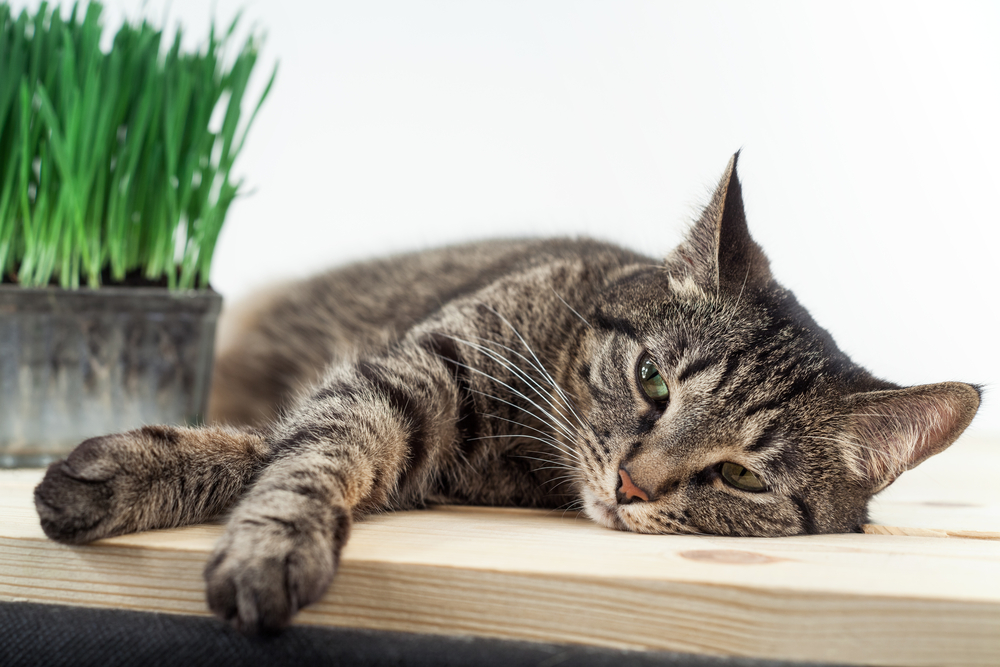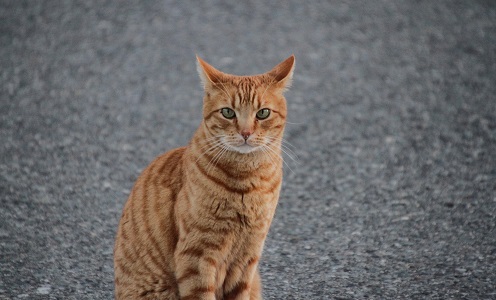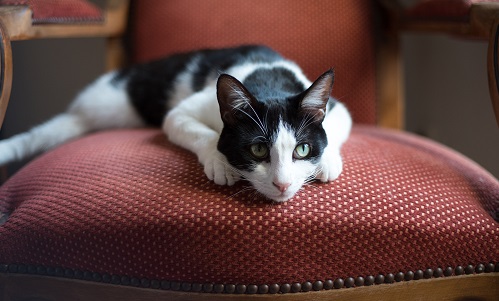Has your furry friend recently lost some weight?
If you’ve been hoping your cat would slim down for some time, this development could come as a welcome surprise. However, any sudden change to your cat’s behavior or appearance is a potential cause for concern.
In this short guide, we’ll go over eight potential reasons behind rapid weight loss in cats. After reading the guide, consult with your veterinarian to better understand the reasons behind your kitty’s slimmer figure.
#1 Stress
How do you respond to stress or sadness? Maybe you buy a pint of ice cream—or perhaps you lose your appetite altogether.
Just like us, our feline friends can be sensitive to environmental changes. This, in turn, affects their appetite.
Any of the following could cause stress:
- Moving to a new environment
- Cohabitating with a new pet or new person
- A recent trip to the vet
- Changes to their routine, like an absent person
- Loud noise (construction, parties, etc.)
- Outdoor cats who are visible through the window
If your cat has experienced any of these changes or triggers, they may be more stressed out than you might think. Subtle behavioral changes like decreased appetite or increased marking might be the only telltale signs of your cat’s wellbeing.
Luckily, there are plenty of steps you can take to improve your cat’s stress.
These include:
- Help them adjust – If a new pet or person has entered your home, make sure your cat has a safe space to roam and play while they get used to the unique situation. Gradually increase their exposure to the new family member.
- Make changes to the environment – Is something outside causing stress? Invest in new blinds or curtains. If noise is the culprit, consider a noise-canceling fabric. If you’ve recently moved to a new home, create inviting nooks for your pet to hide, preferably decorated with a blanket or bed with a familiar scent.
- Try pet CBD – Add cat CBD to your pet’s routine. Just like us, cats have endocannabinoid systems that interact with the substances found in hemp. CBD for pets can help to soothe this system, promoting relaxation and overall wellness.
#2 Food Aversion and Allergies
In some cases, there’s simply an issue with your cat food.
Maybe your cat isn’t eating much, but they’re still bothering you in the middle of the night to refill their bowl. Then they leave the food untouched. Or perhaps they’re eating some, only to suffer diarrhea or vomiting a few hours later.
Your pet may have an aversion or allergy to their food. Yes, this can be true even if they’ve been eating the same brand for months or years.1 Age and other environmental factors can cause allergies and preferences to shift over time.
How can you fix this issue?
- Go to your veterinarian for allergy testing and to rule out any other possibilities.
- Try an allergy-safe food.
#3 Hyperthyroidism
Hyperthyroidism refers to the overactivity of the thyroid gland. Most common in older cats, this condition causes elevated levels of the hormones T3 and T4, which regulate the metabolism.2
When your cat has an overactive thyroid, the metabolism speeds up, resulting in weight loss and issues like the following:
- Increased appetite – If your cat is eating more but still losing weight, it could be a sign of an overactive metabolism.
- Thirst – You may also notice your cat drinking more water and urinating more frequently.
- Digestive issues – Along with increased eating, cat diarrhea and vomiting are common in hyperthyroidism.
- Changes to mood and appearance – Aside from worrying about changes in eating patterns, hyperthyroidism can result in restlessness, oily fur, and a matted coat.
Hyperthyroidism is fairly common, affecting about 10% of middle-aged and senior cats. Consult with your veterinarian, who can palpate the thyroid and test blood hormone levels.
If the diagnosis is confirmed, there are several well-established methods for treating the condition and getting your cat back up to a healthy weight. Check out our guide on hyperthyroidism in cats for more information.
#4 Diabetes
Just like humans, cats can develop diabetes, which will consequently affect their ability to metabolize sugar and maintain healthy glucose levels.
The signs of diabetes in cats are somewhat close to the signs of hyperthyroidism. You’ll notice that your cat maintains a healthy appetite but displays other symptoms like:3
- Weight loss
- Thirst
- Increased urination
Because your cat cannot absorb glucose from food, its body will break down its fat, resulting in weight loss.
This diagnosis can be confirmed with a simple blood test showing elevated glucose levels. Then, diabetes can be treated with dietary changes and insulin therapy.
#5 Dental Pain
We, cat lovers, know that it’s essential to get our teeth cleaned a couple of times a year. But it can be tempting to let our kitties’ dental health slide. After all, a feline dental cleaning is an expensive procedure that also requires general anesthesia. It’s quite stressful for pet owners—not to mention our cats!
At the same time, you could be neglecting your cat’s dental health risks of gingivitis and tooth decay. While the most you’ll have to deal with on your end is a little bit of bad breath, the condition can become very painful for your favorite pet.
When you take your kitty to the vet, they’ll receive a full dental examination to assess the need for teeth cleaning or, in some cases, tooth extraction.
#6 Feline Infectious Peritonitis (FIP)
FIP is a coronavirus that primarily affects cats. It tends to occur in environments where there are multiple cats, especially breeding facilities (aka “catteries”). Therefore, it’s often seen in kittens and very young cats.
While most cases are mild, about 10% mutate into more severe mutations.4
Symptoms of this illness can include:
- Fever
- Lethargy
- Weight loss
- Vomiting
- Thirst
- Increased urination
- Seizures
The best course of action when it comes to FIP is preventing it in the first place. If you have multiple cats, be sure to keep all litter boxes and common areas clean.
Because FIP’s symptoms are similar to other common feline health issues, it’s essential to consult your vet about any of the above symptoms.
#7 Parasites
Has your vet ever asked you to arrive at your appointment with a sample of your cat’s stool?
This is done to rule out parasites.
Intestinal parasites, aka “worms,” can take up residence in your cat’s digestive tract and absorb the nutrients from their food.
- While most cats with worms don’t display many symptoms in the early stages, kittens may have a pot-bellied appearance.5
- More severe infections can result in weight loss and diarrhea. Your cat’s anus may also become irritated, in which case you’ll notice them dragging their bottom across the floor.
If your cat is infected, a straightforward course of medication can rid them of their parasites and help them get back on track.
#8 Cancer
The last thing you want to consider is the possibility that your feline friend has cancer.
Unfortunately, 20% of cats eventually get cancer. Two of the most common types to afflict our kitties include:6
- Lymphoma – This blood cancer develops in the lymph nodes and circulates throughout the bloodstream. Keep your cat up to date with feline leukemia vaccinations to minimize their risk.
- Squamous cell carcinoma – This skin cancer can affect the epidermis and the tissue of the mouth. If you notice sores that are slow to heal, it’s time to consult your vet.
If you notice your cat is hiding, it can be another sign that something is wrong.
When in Doubt, Consult Your Vet
Now that you know what causes sudden weight loss in cats, it’s clear that root causes range from easily remedied to potentially heartbreaking.
That’s why it’s so important to consult your veterinarian when you notice something has changed regarding your pet’s weight.
In advance of your appointment, collect a stool from the litter box. Also, make observations about your cat’s:
- Thirstiness
- Frequency of urination
- Use of litter box
- Energy level
- Mood
- Hiding behavior
That way, you can arrive prepared at your appointment. There, your vet will help you sort out the root issue and determine the appropriate course of care.
Canna-Pet for Overall Health
At Canna-pet, we know it’s better not to wait for an emergency to begin taking care of your cat’s long-term comfort.
To make sure your pet is happy and healthy every day, talk to your veterinarian and create an appropriate diet (taking any allergies into account). We’re big fans of organic and all-natural products formulated without pesticides that could harm cats’ health.
CBD can be another helpful addition to your pet’s routine. CBD supports overall wellness and vitality, from soothing stress to reducing discomfort from everyday activity. Shop our line of organic, hemp-derived cat CBD products and discover the benefits for your favorite furry friend.
Sources:
- VCA Hospitals. Food Allergies in Cats. https://vcahospitals.com/know-your-pet/food-allergies-in-cats
- Cornell College of Veterinary Medicine. Hyperthyroidism in cats. https://www.vet.cornell.edu/departments-centers-and-institutes/cornell-feline-health-center/health-information/feline-health-topics/hyperthyroidism-cat
- Cornell College of Veterinary Medicine. Feline Diabetes. https://www.vet.cornell.edu/departments-centers-and-institutes/cornell-feline-health-center/health-information/feline-health-topics/feline-diabetes#:~:text=Clinical%20Signs,routine%20examination%20with%20the%20veterinarian.
- WebMD. Cat FIP. https://pets.webmd.com/cats/cat-fip-feline-infectious-peritonitis#1
- PetGP. Worms in cats. https://pet-gp.co.uk/worms-in-cats-symptoms-causes-and-treatments/#:~:text=More%20serious%20cases%20in%20felines,cat’s%20bottom%20to%20become%20sore.
- RAU Animal Hospital. 4 Types of Cat Cancer. https://www.rauanimalhospital.com/resources/blog/cats/4-types-cat-cancer-and-their-common-symptoms#:~:text=Sadly%2C%20one%20in%20five%20cats,are%20treatable%20if%20caught%20early.






